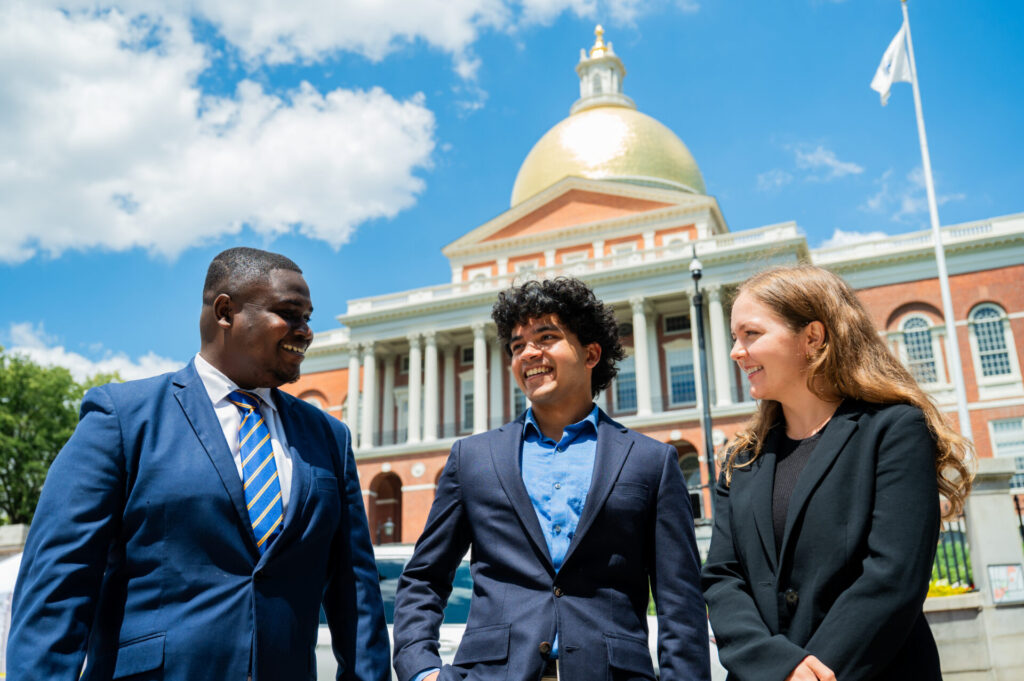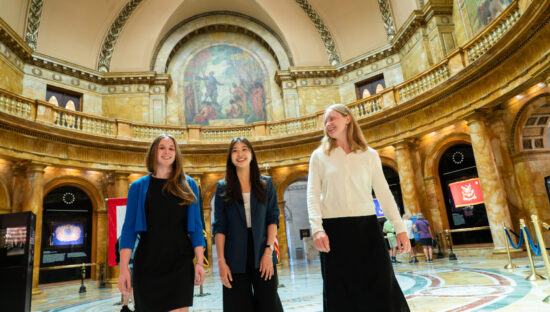
Salata Climate Policy Summer Internship Program
The Salata Institute for Climate and Sustainability at Harvard University seeks student applicants for its Climate Policy Summer Internship Program, in partnership with the Massachusetts State House. The program places Harvard students in climate-focused legislative offices to gain hands-on experience at the intersection of climate, policy, and public service.
-
Funding: $4,500 stipend
-
Time Commitment: Part-Time (20 hours per week)
-
Duration: May 26, 2026 – July 31, 2026 (10 weeks)
-
Format: Primarily in-person
Summary
Program Description
The Climate Policy Summer Internship Program is run by the Salata Institute for Climate and Sustainability in collaboration with climate-focused legislative offices at the Massachusetts State House. The program places Harvard undergraduate and graduate students in legislative offices whose policy agendas address climate, environmental, or sustainability issues in the Commonwealth of Massachusetts.
Through this internship, students gain hands-on experience supporting real-time legislative work while developing a deeper understanding of how climate policy is shaped at the state level. Interns contribute to policy research, stakeholder engagement, and legislative processes while working closely with staff in elected offices.
The program is designed to support students interested in careers at the intersection of climate, policy, and public service. In addition to their placements, interns participate in bi-weekly professional development programming that connects students with climate policy practitioners, Harvard faculty, and peers across the cohort.
Internships are primarily in-person at the Massachusetts State House. Depending on the legislative office, some flexibility around start and end dates may be available.
About the State Legislature
Legislative sessions in Massachusetts are 2 years long. A new legislative session starts on the first Wednesday in January of the odd-numbered years (2027, 2029 etc.) All formal business of the first year of the session concludes in November of that year. The legislature then sits in an informal session until the first Wednesday of January of the second year (2026, 2028, etc.) when the second year of the session begins.
Students working at the Massachusetts State House should anticipate different kinds of work depending on when their internship takes place relative to the legislative session cycle.
Year 1: Written testimony, attend hearings for bills, develop infographics, support work related to budget debate, etc.
Year 2: Research on current bills, research for new bills for the next session, tracking legislation, tracking amendments, attend briefings, etc.
Highlighted News

MORE NEWS

From Harvard to Beacon Hill: Salata interns help write Massachusetts’ climate playbook
Hours and Duration
- Internships are 15-20 Hours/week for 10 weeks starting May 26, 2026 – July 31, 2026
- Internships are primarily in-person with opportunity for occasional remote work
- *Depending on the legislative office, some flexibility around start/end dates may be available.
Qualifications
- Must be an undergraduate or graduate student currently enrolled at Harvard University
- Must be returning as an enrolled student during the Fall term following the internship period
- Must secure housing on their own for the duration of their internship
- Must be able to commute to the Massachusetts State House (24 Beacon St, Boston, MA 02133)
- Must have access to a laptop or personal computer
- Must attend an info session or watch the info session recording
(!) Harvard College applicants must review the Harvard College Summer Funding Policy (!)
Structure & Support
Funding:
- Students selected for an internship through this program will receive a $4,500 stipend
- Payments are made in three installments:
- May: $1,125
- June: $1,125
- July: $2,250
- All funding disbursements are subject to tax
Programming:
- Students selected for the program must participate in bi-weekly Monday programming
- Activities include speaker sessions with climate policy practitioners, excursions and tours, networking sessions, and other educational opportunities
- Programming is primarily in-person
Housing:
- The Salata Institute does not offer housing through this program
- Students are responsible for securing their own housing for the duration of the internship program
- Qualifying students may apply for an additional $1,000 housing stipend. Housing Stipends are determined on an as-need-basis
- Students are encouraged to explore the following resources:
Past & Current Legislative Offices
2026 Participating Legislative Offices
Representative Tommy Vitolo, 15th Norfolk
Priority Areas: Clean Energy Transition, Climate Action and Resilience, Environmental Justice
Representative Tommy Vitolo advocates for climate action, sustainability, and clean energy. With a Ph.D. in systems engineering from Boston University, he has focused his Legislative work on reducing carbon emissions, promoting renewable energy, and addressing the impacts of climate change on all communities. Before his legislative work, Rep. Vitolo was an associate at Synapse Energy Economics, where he worked to retire coal plants, cut pollution, and transition to clean energy systems. While at the State House, Rep. Vitolo has championed initiatives like adding solar panels to public buildings, barring fossil fuels from new developments, promoting bike lanes to support sustainable living in his community of Brookline, and updating regulations to promote the transition to clean energy. His work reflects a strong commitment to community-driven solutions and meaningful reforms to combat environmental challenges.
Senator Dylan Fernandes, Plymouth & Barnstable District
Priority Areas: Renewable Energy, Agricultural Resilience, Eco-Tourism and Developing a Blue Economy, Resource Protection, Clean Water.
Senator Fernandes is committed to addressing the climate crisis with the urgency it demands, driving economic growth in Massachusetts through clean energy and innovation. In 2017, he sponsored successful legislation (H.3564) recommitting Massachusetts to the Paris Climate Accord. He also created the state’s first Ocean Acidification Commission and champions renewable energy, including offshore wind, envisioning his district as a leader in the Blue Economy. A strong advocate for clean water, he supported the Cape and Islands Water Protection Fund, which provides major subsidies for wastewater infrastructure, and helped triple the Title 5 Septic System Tax Credit to protect waterways. These efforts promote sustainability and economic resilience. Interns will assist with research, policy memos, press materials, and may create graphics, attend briefings, and handle administrative office responsibilities.
Representative Joan Meschino, 3rd Plymouth
Priority Areas: Natural and Working Lands, Building Decarbonization, Climate Finance, Drought Management
Interns working in Representative Meschino’s office provide daily legislative and communication support and will be asked to apply their academic research and writing skills to a specific policy area in support of the Representative’s current climate legislation. Representative Meschino’s climate-related priority areas include natural and working lands, building decarbonization, climate finance, and drought management.
Representative David LeBoeuf, 17th Worcester
Priority Areas: Economic Justice, Health Equity, Water Resource Management
Representative LeBoeuf’s climate policies are centered on economic justice and health equity. He has spearheaded efforts to make public transportation fare-free in Central Massachusetts and is the lead sponsor of legislation to electrify buses for public transit. Rep. LeBoeuf’s district is a designated environmental justice community, and he is working locally to mitigate heat islands, remediate brownfield sites, reduce childhood exposure to lead, and manage water resources.
Representative Steve Owens, 29th Middlesex
Priority Areas: Clean Energy Transition, Transportation Electrification, Building Decarbonization
Representative Steve Owens is a leading advocate for climate action in the Massachusetts House of Representatives. As House Chair of the Clean Energy Legislative Caucus, he advances legislation to transition the Commonwealth to a clean energy economy, with a focus on transportation electrification and phasing out natural gas as a heating source.
Representative Owens also serves as House Vice-Chair of the Joint Committee on Tourism, Arts and Cultural Development and is a member of the Committees on Ways and Means; Advanced Information Technology, the Internet and Cybersecurity; and Transportation. Interns will assist with research, policy memos, legislative tracking, communications, and general office responsibilities, and may attend briefings or hearings.
Representative Shand, 1st Essex
Priority Areas: Climate Adaptation & Community Resilience, Coastal & Ecosystem Protection (Wetlands, Salt Marshes, Coastal Zones), Water Quality Improvement & Environmental Health
Representing the coastal communities of Newburyport and Salisbury Representative Shand’s climate work focuses on building resilience by advancing critical climate adaptation and mitigation strategies. Her key legislative efforts include innovative housing solutions, coastal zone management and protection, navigating affordability issues surrounding climate goals, and nature-based solutions. Representative Shand has advocated for legislation to mitigate the impacts of climate change through critical salt marsh and wetland restoration. Her office also prioritizes important water quality improvements, especially in the Merrimack River which experiences elevated pollution levels that impact the health of the communities in her district. Interns working in Representative Shand’s office will gain valuable hands-on experience, working closely with her staff and the Representative to learn the policymaking process in Massachusetts.
Representative Mark J. Cusack, 5th Norfolk
Priority Areas: Clean Energy Affordability, Energy Policy & Regulation, Utilities and Telecommunications
Representative Mark Cusack is House Chair of the Joint Committee on Telecommunications, Utilities, and Energy, where he leads efforts to advance clean energy legislation while prioritizing affordability for Massachusetts residents. His work during the 195th General Court focuses on evidence-based energy policymaking informed by stakeholder engagement and regulatory analysis.
Interns will support Committee staff by researching and analyzing energy and climate legislation, tracking bills and amendments, reviewing stakeholder testimony, preparing meeting materials, and attending hearings or briefings. Interns may also contribute to talking points and present project updates, gaining hands-on experience in energy policy and the State House legislative process.
Senator Lydia Edwards, Boston, Revere, and Winthrop
Priority Areas: Climate Justice, Climate Adaptation & Community Resilience, Climate-Safe Buildings, Food Justice, Education, Water Transportation
Senator Edwards is dedicated to Environmental Justice, and her legislative work centers the community voices she represents. Her policy work focuses on creating policies that connect the neighborhoods in her district via water transportation and MBTA ferries, as well as incentivizing the construction of Climate-Safe Buildings. As an intern, you’d be helping to research policy ideas, work on the upcoming Environmental Bond Bill, and help develop communication strategies to share our climate work with constituents and stakeholders.
Information Sessions
The Salata Institute will host 2 Zoom-based information sessions in 2026 to share information about this program with potential applicants.
Applicants must attend an information session, or watch the recording before applying. An information session recording will be posted on January 30, 2026.
To register – select one of the two options below:
Application – Key Dates
- Opens: January 26, 2026
- Deadline: Sunday, February 22, 2026 (11:59 PM)
Application Limit
Applicants may apply to 2 (maximum) legislative host offices.
- How do I find housing?
- Start looking early! Many summer housing deadlines are in February or March
- Harvard College students should visit: https://collegehousing.fas.harvard.edu/summer-housing/
- Harvard Graduate students can visit: https://www.huhousing.harvard.edu/
- Still need help? Contact oona_gaffney@harvard.edu
- I am an international student, can I still apply?
- Yes. International students may apply for this program. International students need to complete the Curricular Practical Training (CPT) process and requirements to be eligible to work. Please refer the Registrar’s Office at your school.
- Who qualifies for the housing stipend?
- Students who receive financial aid or whom have extenuating financial circumstances may apply to receive up to +$1,000 in housing assistance.
- Are the start and end dates flexible?
- No. Students must start their internships on May 26, 2026. Internship are 10 weeks long and will end on July 31, 2026. Students must complete 20 hours/week for the full duration of the internship program.
- Can I work remotely?
- Sometimes. Students are expected to be primarily in-person and spend most of their internship hours working in-person at the Massachusetts State House. Students may sometimes be permitted by their employer to work remotely – but arrangements must be made on a case-by-case basis and approved by the Salata Institute.
- Can I apply for funding with a legislator who is not on the list?
- No. To participate in this program, students must select one of the pre-approved legislative host offices listed on this webpage.
- Are there any guidelines for the Writing Sample?
- Writing samples are used by the employers to evaluate your writing skills, tone and style. Please choose an example that you think demonstrates your abilities as a writer. Examples include an excerpt of a past research paper or writing assignment, a blog post, article or another contribution. Writing samples should be less than 750 words and limited to a maximum of 2 pages. All writing samples should be submitted as PDFs and use the following naming convention: Writing_Sample_[Your Name]
- How are interviews conducted?
- Most host offices conduct interviews via Zoom or video call. Some offices may conduct phone screenings in advance. Applicants are very rarely asked to conduct an in-person interview.
- Which host offices are the most competitive or receive the most applications?
- There is no simple answer – application volumes across the host offices vary from year to year. If you are wondering about how to put your best foot forward, our recommendation is to apply to offices whose priority areas align with your interests. The strongest applications are the ones where the student is passionate about the issue, so let that lead.